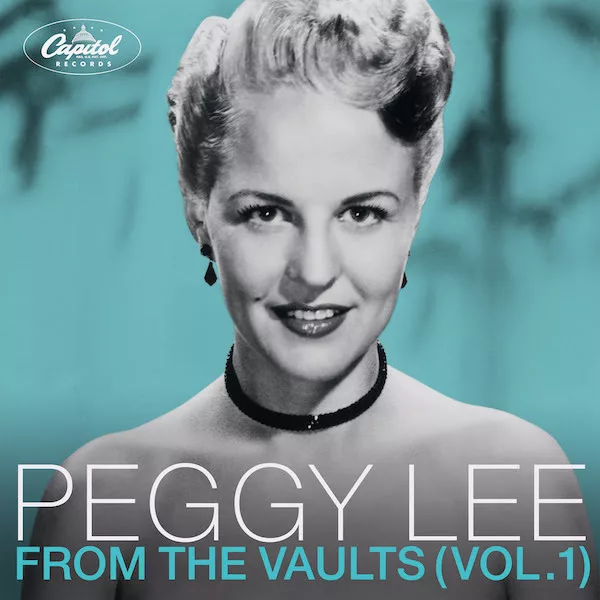
LOS ANGELES (Capitol Records) – Capitol Records and Universal Music Enterprises (UMe), in conjunction with Peggy Lee Associates, announce the release of Peggy Lee From the Vaults (Vol 1.), the first in a digital series that collects Peggy Lee’s performances not yet available on streaming platforms. With the launch of this series, her entire catalog of issued master recordings from the Universal family of labels—Capitol, Decca, A&M, and Polydor—will now be accessible via digital streaming.
Amid her national popularity as Benny Goodman’s big band “canary” (1941-1943), Peggy Lee left the band to get married, and she semi-retired to become a wife and mother. For almost two years, she juggled domestic duties with a gradual return to music, signing with Capitol Records in late 1944 when she was 24. Peggy Lee From The Vaults (Vol. 1) features 12 of her earliest tracks recorded between 1944 and 1948 for Capitol Records, including three songs written by Lee and her first husband, guitarist Dave Barbour: “What More Can a Woman Do?,” “Don’t Be So Mean to Baby,” and “Just an Old Love of Mine.”
Drawing inspiration from being a newlywed and “feelings for David and our life,” “What More Can a Woman Do? was the first Peggy Lee composition ever recorded and one of the very first to be published. “I was washing dishes and just sang out my love for him,” she reminisced in Miss Peggy Lee, An Autobiography. Originally recorded in December 1944 in Lee’s second session for Capitol Records Lee and Barbour revisited the song in 1950 in an early music video; watch here. Sarah Vaughan recorded the song in 1945 (five months after Lee’s original recording), and it was the title track from Big Maybelle’s 1962 album.
The Lee-Barbour composition “Don’t Be So Mean to Baby” was recorded three times in 1946. The first version was exclusively for radio airplay, commonly known as a Capitol transcription; the second version, planned for commercial release by the label, went unreleased until 2008; and the third version, included here, was originally released in 1948. The song was also later recorded by Duke Ellington and His Orchestra, featuring singer Al Hibbler, in 1947.
“Just an Old Love of Mine” is a melancholy Lee-Barbour composition released by Capitol in 1947 as the B-side of a 78-rpm single. The song quickly found favor amongst Lee’s peers, including Doris Day, Billy Eckstine, Bing Crosby, Dorothy Lamour, Tommy Dorsey with singers Lucy Ann Polk and Stuart Foster, and Shep Fields with singer Toni Arden.
Peggy Lee’s recording of “Everybody Loves Somebody” has been featured on a multi-artist Capitol compilation release but has never been available on a Peggy Lee digital album. Widely associated with Dean Martin, who took the song to the top of the charts in 1964, Peggy Lee recorded it first in 1947, and Frank Sinatra was the first to release it in 1948.
Another noteworthy highlight is “Just a Shade on the Blue Side,” enticingly phrased by Lee and imaginatively backed by a combo under Barbour’s direction. Composed by the multi-talented master of American song, Hoagy Carmichael, this rarely-covered song remains obscure to this day. Dating back to the 1930s, the playfully coy “She Didn’t Say Yes” was first heard in the 1931 Jerome Kern-Otto Harbach Broadway musical The Cat and the Fiddle. Lee’s 1946 interpretation was originally included on the album Jerome Kern’s Music, a 1946 Capitol Records tribute to the composer, who passed away in late 1945.
Future volumes in the From The Vaults series will move chronologically from 1949 to 1972, Peggy Lee’s last year under contract with Capitol Records.
From the Vaults (Vol.1) Tracklisting:
1.What More Can A Woman Do? (12/27/44)
2. I Can See It Your Way, Baby (12/26/45)
3. Baby, You Can Count On Me (04/11/46)
4. He’s Just My Kind (09/23/46)
5. She Didn’t Say Yes (09/23/46)
6. Don’t Be So Mean To Baby (10/17/46)
7. Speaking Of Angels (01/29/47)
8. Just An Old Love Of Mine (07/03/47)
9. Everybody Loves Somebody (11/20/47)
10. So Dear To My Heart (11/26/47)
11. Just A Shade On The Blue Side (12/02/47)
12. Someone Like You (12/14/48)
Date in (parenthesis) denotes recording date of the song.
